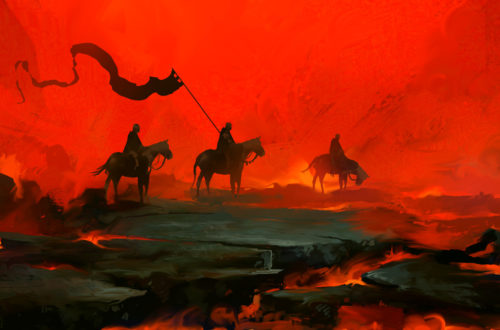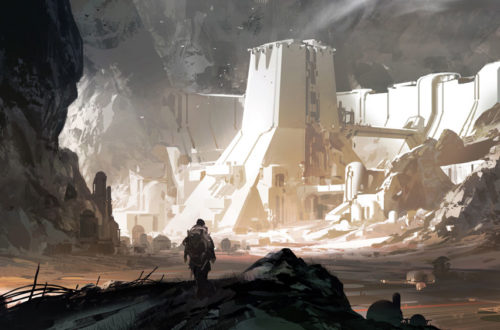Image: Tianjin Binhai Library by Ossip Van Duivenbode
We are in a time of democratization of the production of creative works. Working at Unity in the games business, our mission statement has been that we are “democratizing game development”. Now more and more companies are adopting this as part of their mission as well. The playing field is being leveled and more and more people are entering the game making space, and almost all other creative product spaces as well. Technology across the board is making it easier and easier to make almost every kind of thing. This is a good thing on balance. The more people we have creating, the more diversity of voices we have, the more interesting work will ultimately get made. I think there’s also a kind of network effect where more people making interesting things and sharing them and having a creative dialog accelerates the depth and fluidity of the creative conversation and quality of the work. In the past we would have to create a work and then wait months or years for it to reach the public and our community of creative peers, and then usually wait months for feedback to come back. This process has now been collapsed into days, hours and minutes. We can live stream our creative process and receive feedback from our audience in real time, which is pretty amazing.
On the other hand, this results in an ocean of new work to explore. The chances of having an individual piece of work discovered randomly are lowered and more and more we are competing for people’s time and attention. Makers of creative media are running into the challenge of audiences just not having enough time to consume all the work that we’re making. Paolo Pedercini has given a wonderful talk at Indiecade Europe (transcript and slides here) with some imaginative solutions to the problem of too much democratization of culture entitled “Indiepocalypse Now”. Some of his solutions are pretty wonderful, including introducing universal basic income to give people more time to consume cultural works, and making games for animals.
My feelings about this ocean of creative works are varied. On one hand, there is a crowd of people who angrily shake their fists and say “There are too many games being made! The marketplaces are being flooded with crap! No one can make a living!” I think one of the main motivators of this anger is the feeling of loss of a privileged position. Specifically in games, in the past if you were a member of a certain elite who had technical training, access to computers and the internet and the time and money to make a game on your own, your chance of getting one of the spots on a storefront like Steam were much better. There was less competition and if you did get on the store, you were virtually guaranteed an income. There’s a dynamic here of a privileged group being divested of their privilege, and being angry about it. I don’t take the side of these people. If what they are creating was not unique or interesting enough to compete in this landscape, oh well. Their elite status was previously artificially supported, a kind of subsidy of privilege. We see this in many fields in which mediocre white men are propped up by systemic factors, even though they are actually dumb and boring. It’s probably not a great loss to the world that they don’t get to make their mediocre work and earn a living from it. In a sense the new ocean of content is more of a meritocracy. Those who make work that stands out are rewarded, and those that make more of the usual basic whatever starve into obscurity. Of course the reality is more complex, but this is one facet of it.
The ocean of creative work continually splashing onto the internet however does present a challenge, especially given the fact that this process is only going to accelerate. Pedercini’s solutions of liberating more time or going after new types of audiences are good ones, but I think that we also need to consider the roles of, and opportunities for intermediaries in this era. One player we’ve seen arise in the game space that I am a big fan of is Itch.io. Itch created an open and inviting, easy to use space to invite all types of people to upload and share their work, with a uniquely generous ‘pay what you want’ revenue share model in which game developers can choose how much of their revenue to share with the platform. They also did a terrific job of curating creative and unique games for their home page, which made it worth visiting in and of itself, to see what weird stuff people were making. By it’s nature this makes it somewhat niche, and in my opinion this more of a solution than a problem. Game developers are drawn to Steam because of its huge audience, but it’s a huge generic audience that is mostly interested in very run of the mill, commercial titles. It’s become the Walmart of PC gaming. The main thing that Walmart type institutions have to offer value wise is cheap prices and the idea that you can drive to one place and buy literally everything. But in a digital landscape, how valuable is this? With a well designed store and a companion app (which Itch has, and is great) there is much less difference in terms of convenience. Importantly, Steam has also to an extent followed Itch’s lead by moving in a more open direction, allowing anyone to sell on the platform if they pay a fee (which is less good than Itch which is totally free). And Steam has essentially abandoned any attempt at human curation in favor of a heavily algorithmic approach, which in my opinion feels cold and uninteresting. It’s very rare that Steam recommends me anything I actually want, whereas the human curation on Itch is something I always find interesting to check out, even if it’s not precisely what I was already looking for.
Epic Games, makers of the Unreal Engine and mega-hit Fortnite have announced that they are opening their own store which, judging by their press release, seems to be aimed directly at solving some of the problems which Steam has ignored. They plan to curate games from the beginning and also offer a more favorable revenue share to developers. I think that this is a net positive for the game space as Steam has grown moribund and taken for granted it’s monopoly-like grip on the PC gaming space. Hopefully some competition will force them to actually invest in and pay attention to their platform and it’s developers needs. An interesting program which Epic is also launching is an opportunity for community creators including streamers and cosplayers to earn revenue while promoting games. Importantly I don’t know how this will work, so it may end up being terrible. Potentially though, I think this is one of the most important and interesting aspects of their new platform.
The video games industry has long benefited from unpaid fan labor in many forms. Fan creators invest massive amounts of time, care and money into creative work which centers around their favorite games. So far, that exchange has been massively one sided. They pay to buy games, and then pay to enrich those games communities with their labor. The rise of community created gaming video content as a massive driver of sales and attention has shifted this dynamic somewhat, with content creators assuming a newly prominent role and creating opportunities for them to monetize via things like ad revenue and sponsorship. If the mainstream games industry is wise it will recognize that this is fan work is valuable and effective labor and create opportunities for those creators to monetize what they are doing within the existing marketplaces.
Steam took a step in this direction with the creation of it’s curators system, allowing users to create lists of games and review them, but stopped short of allowing them to monetize this as a business. There is an existing business model for this which anyone who is familiar with internet marketing will recognize, which is affiliate sales. Affiliate sales are when someone promotes a product that they didn’t create via a custom link, and earn a commission on any resulting sales. In the internet marketing world (think “make money online” courses) the commission rates on these types of sales can be fifty percent. They recognize that those sales would not have happened without the labor of the people promoting, and therefore compensate them very well. I believe that a model like this could offer a great solution to both of these challenges: on one hand it creates an opportunity to mobilize an army of curators and authentic grass roots marketers who help to create visibility for the things they actually already love, and on the other hand encourages and creates a stable platform for these same fan and community workers to monetize and make sustainable the work which they are already doing in this space. Whether or not Epic with their new store or someone else will understand and take advantage of this opportunity remains to be seen, but my prediction is that whoever does will be rewarded handsomely.





